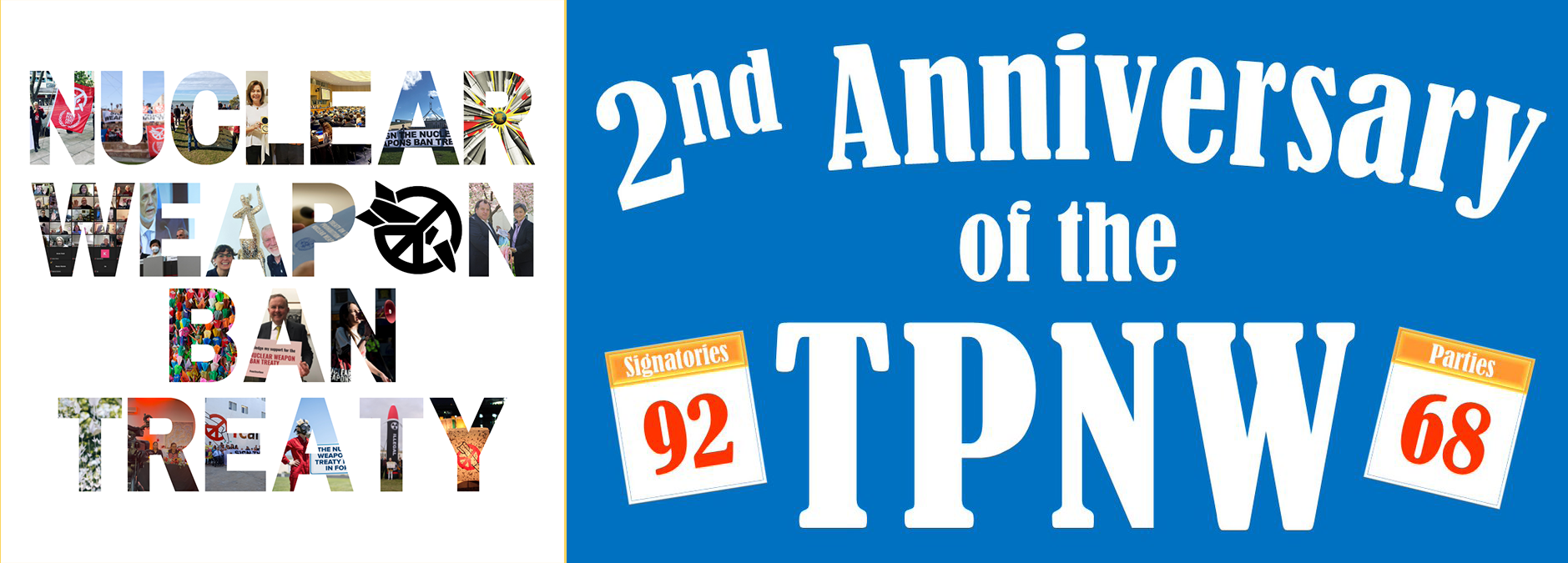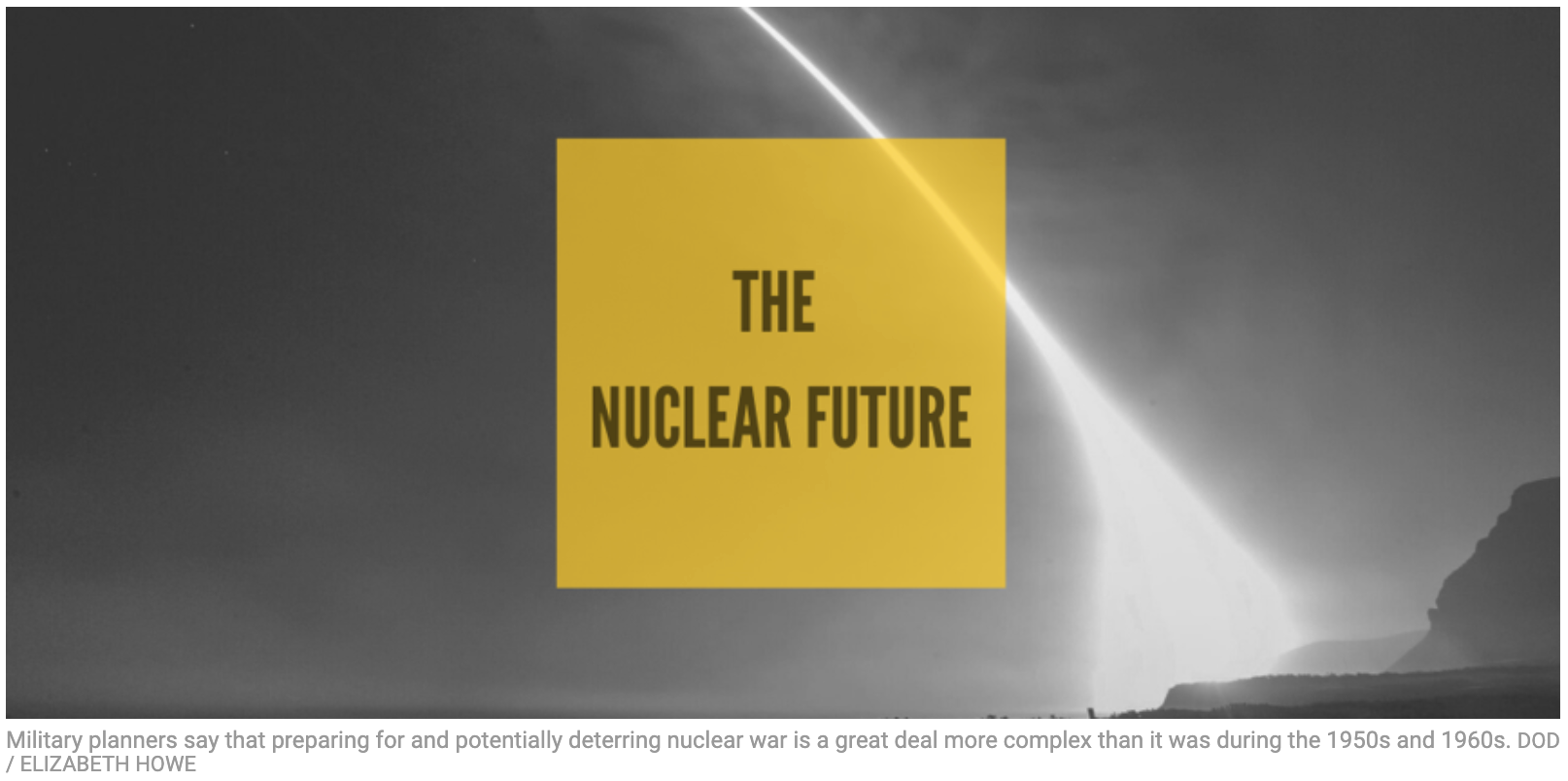Recent News
U.S. Strategic Posture Commission Ratchets Up Nuclear Arms Race
FOR IMMEDIATE RELEASE, October 12, 2023
Jay Coghlan – 505.989.7342 | Email
Santa Fe, NM – Today, America’s Strategic Posture, The Final Report was released by the Congressional Commission on the Strategic Posture of the United States. In its own words:
“The Congressional Commission on the Strategic Posture of the United States was established by the Fiscal Year (FY) 2022 National Defense Authorization Act (NDAA), and concludes that America’s defense strategy and strategic posture must change in order to properly defend its vital interests and improve strategic stability with China and Russia. Decisions need to be made now in order for the nation to be prepared to address the threats from these two nuclear-armed adversaries arising during the 2027-2035 timeframe. Moreover, these threats are such that the United States and its Allies and partners must be ready to deter and defeat both adversaries simultaneously.”
Return of US nuclear weapons to UK would be an escalation, says Russia
Moscow says it would respond with ‘countermeasures’, after US air force budget item hinted at possible move
Julian Borger and Andrew Roth THE GUARDIAN | September 5, 2023 theguardian.com
The Russian foreign ministry has said Moscow will view any move to return US nuclear weapons to the UK as an escalation and will respond with “countermeasures” for its own security.
The foreign ministry spokesperson Maria Zakharova was responding to a report last week about an item in the 2024 US air force budget for building a dormitory at RAF Lakenheath in Suffolk for personnel on a “potential surety mission” – military jargon for nuclear safety and security. It raised the prospect of the return of US nuclear weapons to British soil for the first time in more than 15 years.
“If this step is ever made, we will view it as escalation, as a step toward escalation that would take things to a direction that is quite opposite to addressing the pressing issue of pulling all nuclear weapons out of European countries,” Zakharova said.
Abolishing Nuclear Weapons is a Moral Imperative
View Recording of the March 9th PDA CNM Community Gathering:
PDA CNM welcomed Archbishop John C. Wester, Archbishop of Santa Fe, and our own executive director of Nuclear Watch New Mexico, Jay Coghlan, to speak at their March 9, 2022 monthly gathering: “[Archbishop Wester's] courage in speaking out against the proliferation of nuclear weapons inspires us at PDACNM to follow his example and continue the fight against this peril, especially given the threat of a possible imminent war between two nuclear powers.
Jay Coghlan, executive director of Nuclear Watch New Mexico, has worked successfully against radioactive incineration at the Los Alamos National Lab, and in Clean Air Act, Freedom of Information Act and National Environmental Policy Act lawsuits against the Department of Energy. He prompted a 2006 independent study that concluded plutonium pits last at least a century, refuting the NNSA’s assertion that we “need” new-design nuclear weapons and expanded plutonium pit production.”
The Nuclear Ban Treaty
Overview
The U.N. Treaty
on the Prohibition of Nuclear Weapons
On 7 July 2017 – following a decade of advocacy by ICAN and its partners – an overwhelming majority of the world’s nations adopted a landmark global agreement to ban nuclear weapons, known officially as the Treaty on the Prohibition of Nuclear Weapons. It will enter into legal force once 50 nations have signed and ratified it.
Prior to the treaty’s adoption, nuclear weapons were the only weapons of mass destruction not subject to a comprehensive ban, despite their catastrophic, widespread and persistent humanitarian and environmental consequences. The new agreement fills a significant gap in international law.
It prohibits nations from developing, testing, producing, manufacturing, transferring, possessing, stockpiling, using or threatening to use nuclear weapons, or allowing nuclear weapons to be stationed on their territory. It also prohibits them from assisting, encouraging or inducing anyone to engage in any of these activities.
Why a ban?
A nation that possesses nuclear weapons may join the treaty, so long as it agrees to destroy them in accordance with a legally binding, time-bound plan. Similarly, a nation that hosts another nation’s nuclear weapons on its territory may join, so long as it agrees to remove them by a specified deadline.Nations are obliged to provide assistance to all victims of the use and testing of nuclear weapons and to take measures for the remediation of contaminated environments. The preamble acknowledges the harm suffered as a result of nuclear weapons, including the disproportionate impact on women and girls, and on indigenous peoples around the world.
The treaty was negotiated at the United Nations headquarters in New York in March, June and July 2017, with the participation of more than 135 nations, as well as members of civil society. It opened for signature on 20 September 2017. It is permanent in nature and will be legally binding on those nations that join it.
Nuclear weapons are the most inhumane and indiscriminate weapons ever created. That is why it is time to end them, before they end us.
Nuclear weapons are the most inhumane and indiscriminate weapons ever created. They have catastrophic humanitarian and environmental consequences that span decades and cross generations; they breed fear and mistrust among nations, as some governments can threaten to wipe out entire cities in a heartbeat; the high cost of their production, maintenance and modernisation diverts public funds from health care, education, disaster relief and other vital services. Banning these immoral, inhumane weapons under international law was a critical step along the path to ending them.
With the adoption of the UN Treaty on the Prohibition of Nuclear Weapons (TPNW) on July 7th, 2017, the world's majority took a critical step towards making that nuclear-weapon-free future a reality.
Nuclear Weapons Ban Treaty News & Updates
McGovern is first member of Congress to address UN about Nuclear Weapon Ban Treaty
“For some reason, we have a lot of the establishment that say it’s just a fact that we have to live with it,” McGovern said…“If we can’t reach our goal quickly, maybe we can engage in curtailing nuclear weapons.”
“Anything can happen if there’s the political will,”
By SCOTT MERZBACH, THE DAILY HAMPSHIRE GAZETTE | November 27, 2023 gazettenet.com
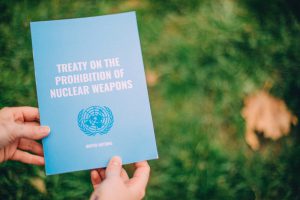 NORTHAMPTON — A treaty to eliminate nuclear weapons and ban anything associated with their development and manufacture has been ratified by 69 countries, with an additional 28 countries in the process of ratification, since the international agreement was signed in 2017.
NORTHAMPTON — A treaty to eliminate nuclear weapons and ban anything associated with their development and manufacture has been ratified by 69 countries, with an additional 28 countries in the process of ratification, since the international agreement was signed in 2017.
The United States, though, along with many of its allies and another eight nations that possess nuclear weapons, remain holdouts to the Treaty on the Prohibition of Nuclear Weapons, otherwise known as the Nuclear Weapon Ban Treaty.
For the first time on Monday, though, as the weeklong Second Meeting of State Parties to the Treaty on the Prohibition of Nuclear Weapons got underway at the United Nations in New York, a member of the U.S. Congress was present for the discussions.
Wasted: 2022 Global Nuclear Weapons Spending – New Report from the International Campaign to Abolish Nuclear Weapons
In its report “Wasted: 2022 Global Nuclear Weapons Spending” the International Campaign to Abolish Nuclear Weapons shows in 2022, the year of the Russian invasion of Ukraine, nine nuclear-armed states spent $82.9 billion on their nuclear weapons, more than $157,000 per minute, an overall increase of $2.5 billion from 2021.
By the International Campaign to Abolish Nuclear Weapons (ICAN) | June 12, 2023 icanw.org
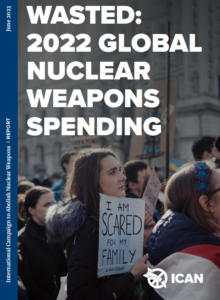 Download the Executive Summary
Download the Executive Summary
Read the Executive Summary in Italian
Download the full report
Nine countries spent $82.9 billion on nuclear weapons, of which the private sector earned at least $29 billion in 2022. The United States spent more than all of the other nuclear armed states combined, $43.7 billion. Russia spent 22% of what the U.S. did, at $9.6 billion, and China spent just over a quarter of the U.S. total, at $11.7 billion.
This is the fourth annual report documenting massive investments in global nuclear weapons spending. Through an ever-changing and challenging security environment, from security threats of climate change to the COVID-19 pandemic to the Russian invasion of Ukraine, nuclear weapons spending has steadily increased, with no resulting measurable improvement on the security environment. If anything, the situation is getting worse.
As companies throw money at lobbyists and researchers to assert the continued relevance and value of nuclear weapons, the record shows the inutility of weapons of mass destruction to address modern security challenges — and the legitimate fear, backed by peer-reviewed scientific evidence, that they can end global civilisation as we know it.
ICAN: The U.S. Spent $43.7 Billion on Nuclear Weapons Last Year—More Than EVERY Other Nuclear-Armed Nation COMBINED
A new report from the Nobel Peace Prize-winning International Campaign to Abolish Nuclear Weapons shows that the world’s nine nuclear-armed countries spent a total of $82.9 billion on nuclear weapons, “of which the private sector earned at least $29 billion in 2022.” The United States spent more than all of the other nuclear armed states combined, $43.7 billion. Russia spent 22% of what the U.S. did, at $9.6 billion, and China spent just over a quarter of the U.S. total, at $11.7 billion.
ICAN states, “The nine nuclear-armed states may have wasted $157,644 a minute on nuclear weapons in 2022, but no matter how much they spend, their nuclear weapons remain tools of terror and intimidation propped up by a mythical tale of deterrence that is rapidly unravelling.
“Through an ever-changing and challenging security environment, from security threats of climate change to the Covid-19 pandemic to the Russian invasion of Ukraine, nuclear weapons spending has steadily increased, with no resulting measurable improvement on the security environment…If anything, the situation is getting worse.”
“Luck, not reason or strategy, has kept nuclear weapons from being used in warfare for the past 78 years. But we can’t count on our luck to hold in perpetuity.”
If you need any more convincing of this fact, or of how “unacceptably dangerous nine countries’ reliance on nuclear weapons is,” watch this POV video where you’re the President and a nuclear attack is imminent. What do you do?
@kurz_gesagt POV: You’re the President and a nuclear attack is imminent. What do you do? #kurzgesagt #kurzgesagt_inanutshell #inanutshell #kurzgesagt_discover #nuclearwar #nuclearattack #nuclearattackwarning #pov #warzone #atomicbombs #emergency #urgent #decision #now ♬ original sound – Kurzgesagt – In A Nutshell
ICAN: G7 Hiroshima summit fails to deliver progress on nuclear disarmament
“This is more than a missed opportunity. With the world facing the acute risk that nuclear weapons could be used for the first time since Hiroshima and Nagasaki were bombed, this is a gross failure of global leadership. Simply pointing fingers at Russia and China is insufficient. We need the G7 countries, which all either possess, host or endorse the use of nuclear weapons, to step up and engage the other nuclear powers in disarmament talks if we are to reach their professed goal of a world without nuclear weapons” — ICAN Executive Director Daniel Hogsta
Update 20 May 2023: the G7 leaders have just issued the final communique from their summit in Hiroshima. It claims they have “taken concrete steps to strengthen disarmament and non-proliferation efforts, towards the ultimate goal of a world without nuclear weapons with undiminished security for all” but it doesn’t say what these steps are. That’s because it can’t.
What we got from the leaders’ discussion on nuclear weapons yesterday was a rehash of ideas and proposals that have failed to deliver progress over the past three decades. They did not announce anything new or concrete. They couldn’t even bring themselves to follow the G20 and TPNW member states by condemning all nuclear threats. Instead they reserved their condemnation for Russia’s and North Korea’s threats, which, while justified, fails to acknowledge how the G7’s own nuclear doctrines are based on the threat to use nuclear weapons and so contribute to the acute danger these weapons pose to everyone.
The G7’s detailed statement “G7 Leaders’ Hiroshima Vision on Nuclear Disarmament”, issued on May 19, falls far short of providing any meaningful outcomes for nuclear disarmament. After months of preparation and amid high expectations, the leaders are missing the moment to make the world safer from nuclear weapons, instead of confronting nuclear threats with a concrete, credible plan for nuclear disarmament – like the Treaty on the Prohibition of Nuclear Weapons- they are barely even paying lip service to the horrors of Hiroshima, the first city attacked by nuclear weapons.
Nuclear Ban Treaty: Updates & 2nd Anniversary Celebrations 🎉

January 22, 2023
International, signatures, TPNW: Djibouti signs TPNW
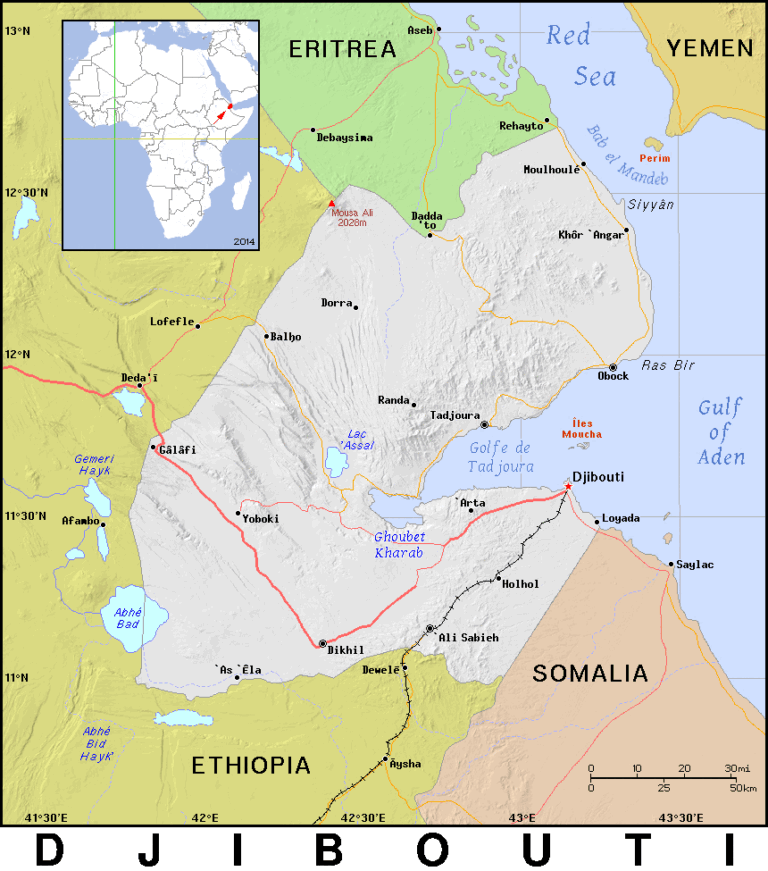
On January 9, 2023, the small island country of Djibouti became the 92nd country to sign the Treaty on the Prohibition of Nuclear Weapons (TPNW). Djibouti voted in favor of the treaty at the treaty negotiations in 2017 and is the latest country to finally sign it. Another 30 countries voted for the treaty and have not yet signed it, while 27 countries have signed the treaty but are still going through the ratification process.
Djibouti is now committed to a swift ratification process, so it can join the 68 countries who have signed and fully ratified the TPNW, putting the treaty’s prohibitions into effect in those countries. Djibouti is also calling on all countries who have not yet done so to sign and ratify the treaty. A UN General Assembly resolution passed in December 2022 called on all states to sign, ratify, or accede to the TPNW “at the earliest possible date”.
The post Djibouti signs TPNW appeared first on NuclearBan.US.
Letter to Biden: Sign the TPNW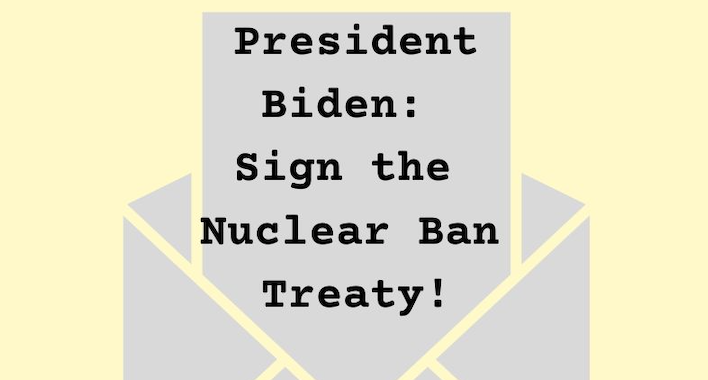
Draft letter to President Biden is here:
To sign your organization onto this letter:
Op-Ed/short version of the Biden letter here:
To send this to Biden as an individual, click here
The post Letter to Biden: Sign the TPNW appeared first on NuclearBan.US.
ICAN IGTV
The international campaign to abolish nuclear weapons on instagram (@nuclearban) tackling some of the more technical legal questions of the treaty: what does entry into force mean, what happens now? Joined with experts, they dive into international law and the TPNW (without getting too technical!) through instagram chats to help break it all down.
View this post on InstagramTim Wright in conversation with Associate Professor Treasa Dunworth of the University of Auckland
A post shared by ICAN (@nuclearban) on
View this post on InstagramA post shared by ICAN (@nuclearban) on
View this post on InstagramA post shared by ICAN (@nuclearban) on
Nothing Found
It seems we can’t find what you’re looking for. Perhaps searching can help.
Quotes
Nothing Found
It seems we can’t find what you’re looking for. Perhaps searching can help.
All Nuclear Arms Reduction and Non-Proliferation Updates & Recent News
Washington Post – Opinion: Nuclear dangers are rising once more. Here’s how the U.S. should respond.
“…The nuclear arms control treaties that did so much to reduce the danger at the end of the Cold War are now disintegrating. The Intermediate-Range Nuclear Forces Treaty of 1987, the first to liquidate an entire class of nuclear-armed missiles, ended in 2019 with U.S. withdrawal under President Donald Trump over alleged Russian violations.”
By the Editorial Board | May 31, 2023 washingtonpost.com
The world is sliding into a new age of nuclear risk — in which miscalculation or accident could lead to catastrophe. The great progress the nuclear powers made in the 1990s through arms control and nonproliferation, reducing nuclear weapons and securing loose materials, is being undone.
The latest retreat came in Minsk, Belarus, on May 25, when Russian Defense Minister Sergei Shoigu and Belarusian Defense Minister Viktor Khrenin signed a formal agreement paving the way for Russia to deploy tactical nuclear weapons in Belarus. These are short-range nuclear weapons such as artillery shells, bombs and missiles for use in battlefield operations — not the long-range weapons deployed on intercontinental missiles. It is not known when Russia will deploy tactical nuclear weapons in Belarus, but the agreement seems to represent the latest act of saber-rattling by President Vladimir Putin since he invaded Ukraine last year. Mr. Putin had earlier said that Belarus would have nuclear facilities ready by July 1 and that Russia would remain in control of them. The United States maintains about 100 tactical nuclear weapons at six bases across five NATO countries.
CNN – Lukashenko offers nuclear weapons to nations willing ‘to join the Union State of Russia and Belarus’
“We must do everything to prevent Putin’s plan to deploy nuclear weapons in Belarus…It directly violates our constitutional non-nuclear status and would secure Russia’s control over Belarus for years ahead. And it would further threaten the security of Ukraine and all of Europe,” — exiled opposition leader Sviatlana Tsikhanouskaya.
By Mariya Knight, Uliana Pavlova and Helen Regan, CNN | May 28, 2023 cnn.com
(CNN)—Belarus President Alexander Lukashenko has claimed that nations who are willing “to join the Union State of Russia and Belarus” will be given nuclear weapons, days after confirming the transfer of some tactical nuclear weapons from Moscow to Minsk had begun.
Lukashenko, a close ally of Russian President Vladimir Putin, made the comments in an on-camera interview released Sunday on the state-run Russia 1 channel.
During the interview, Lukashenko said, “no one minds Kazakhstan and other countries having the same close relations that we have with the Russian Federation.”
“It’s very simple,” he added. “Join the Union State of Belarus and Russia. That’s all: there will be nuclear weapons for everyone.”
Stronger Global Governance is the Only Way to a World Free of Nuclear Weapons
“We can begin uncovering this route to a safer, saner world when we recognize that a great many people and governments cling to nuclear weapons because of their desire for national security. After all, it has been and remains a dangerous world, and for thousands of years nations (and before the existence of nations, rival territories) have protected themselves from aggression by wielding military might….
But what if global governance were strengthened to the extent that it could provide national security? ”
By Lawrence S. Wittner, Professor of History Emeritus at SUNY/Albany and the author of Confronting the Bomb (Stanford University Press) HISTORY NEWS NETWORK | May 21, 2023 historynewsnetwork.org

Some of the 800 members of Women Strike for Peace who marched at United Nations headquarters in Manhattan to demand UN mediation of the 1962 Cuban Missile Crisis
It should come as no surprise that the world is currently facing an existential nuclear danger. In fact, it has been caught up in that danger since 1945, when atomic bombs were used to annihilate the populations of Hiroshima and Nagasaki.
Today, however, the danger of a nuclear holocaust is probably greater than in the past. There are now nine nuclear powers―the United States, Russia, Britain, France, China, Israel, India, Pakistan, and North Korea―and they are currently engaged in a new nuclear arms race, building ever more efficient weapons of mass destruction. The latest entry in their nuclear scramble, the hypersonic missile, travels at more than five times the speed of sound and is adept at evading missile defense systems.
ICAN: G7 Hiroshima summit fails to deliver progress on nuclear disarmament
“This is more than a missed opportunity. With the world facing the acute risk that nuclear weapons could be used for the first time since Hiroshima and Nagasaki were bombed, this is a gross failure of global leadership. Simply pointing fingers at Russia and China is insufficient. We need the G7 countries, which all either possess, host or endorse the use of nuclear weapons, to step up and engage the other nuclear powers in disarmament talks if we are to reach their professed goal of a world without nuclear weapons” — ICAN Executive Director Daniel Hogsta
Update 20 May 2023: the G7 leaders have just issued the final communique from their summit in Hiroshima. It claims they have “taken concrete steps to strengthen disarmament and non-proliferation efforts, towards the ultimate goal of a world without nuclear weapons with undiminished security for all” but it doesn’t say what these steps are. That’s because it can’t.
What we got from the leaders’ discussion on nuclear weapons yesterday was a rehash of ideas and proposals that have failed to deliver progress over the past three decades. They did not announce anything new or concrete. They couldn’t even bring themselves to follow the G20 and TPNW member states by condemning all nuclear threats. Instead they reserved their condemnation for Russia’s and North Korea’s threats, which, while justified, fails to acknowledge how the G7’s own nuclear doctrines are based on the threat to use nuclear weapons and so contribute to the acute danger these weapons pose to everyone.
The G7’s detailed statement “G7 Leaders’ Hiroshima Vision on Nuclear Disarmament”, issued on May 19, falls far short of providing any meaningful outcomes for nuclear disarmament. After months of preparation and amid high expectations, the leaders are missing the moment to make the world safer from nuclear weapons, instead of confronting nuclear threats with a concrete, credible plan for nuclear disarmament – like the Treaty on the Prohibition of Nuclear Weapons- they are barely even paying lip service to the horrors of Hiroshima, the first city attacked by nuclear weapons.
US releases nuclear warhead data in bid to pressure Russia
“Disclosure under New START Treaty follows Russia’s decision to suspend its participation in the nuclear agreement”
ALJAZEERA | May 16, 2023 aljazeera.com

The US Department of State said it was releasing the information publicly as part of its commitments under the New START Treaty, appearing to reverse an earlier decision not to share the data.
Why New Technology Is Making Nuclear Arms Control Harder
“The US, China, and Russia are locked in a high-tech race to perfect new nuclear capabilities, rendering some Cold War safeguards obsolete.”
BY PATRICK TUCKER | Defense One March 14, 2022 defenseone.com
The risks associated with nuclear weapons are rising once again, the heads of three U.S. intelligence agencies told lawmakers last week, as Russia’s brutal invasion of Ukraine intensified.
It wasn’t supposed to be this way.
At the end of the Cold War, President George H.W. Bush boasted that the United States could now reduce its nuclear forces. But today’s arsenals—and global politics—are much different than in 1991. U.S. leaders face threatening dictatorships in Moscow, Beijing, Tehran, and Pyongyang, all racing to create new nuclear bombs and ways to deliver them. Technology, it turns out, is making arms control harder, and that’s forcing a big rethink about nuclear deterrence.
Santa Fe archbishop sees nuclear disarmament as moral imperative
“…If we have nuclear weapons, and if we, heaven forbid, got to the point where we use them on each other, it would be catastrophic. And so I want this to be a conversation, not really a historical one about should we have dropped the bomb in Hiroshima and Nagasaki, but I want to be a conversation on: Should we work toward nuclear disarmament?”
KUNM February 24, 2022 kunm.org
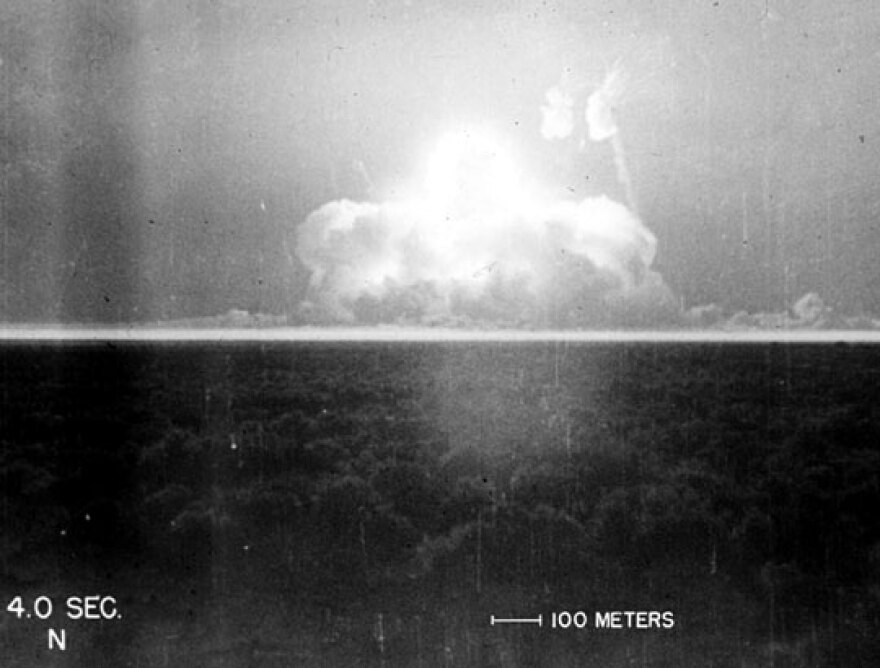
New Mexico is where the atomic age began and the nuclear industry still looms large here, with Sandia National Laboratories and Los Alamos National Laboratory bringing significant economic impact.
But the Archbishop of Santa Fe wants the state, and the world, to forge a new way forward. Rev. John C. Wester issued a pastoral letter last month calling for total nuclear disarmament. Wester spoke to KUNM’s Megan Kamerick about how his perspective changed during a visit to cities in Japan where the United States dropped atomic bombs in World War II. This interview is an excerpt of a longer interview that will air on New Mexico in Focus Friday Feb. 25 at 7 p.m.
JOHN C. WESTER: It was just so horrific, especially with the children. I mean, the whole thing was difficult. But I read that the children saw the bright light, and they ran to the window to see what the light was, you know, and I can only imagine what happened either then or shortly after with the exposure to the radiation.
Germany’s Baerbock pushes for nuclear disarmament
German Foreign Minister Annalena Baerbock called for a “new momentum” to nuclear disarmament as she met with her Swedish counterpart with an eye toward a review of a non-proliferation treaty.
By Ali Harb Aljazeera aljazeera.com
Germany and Sweden have paired up to find ways to get the world’s nuclear powers to move toward committing to disarmament. The foreign ministers met in Stockholm to plot the way forward ahead of next month’s review of the Non-Proliferation Treaty (NPT).
Baerbock has been in talks with her Swedish counterpart Ann Linde and met with the Stockholm Initiative, a group of 16 countries seeking to get rid of nuclear weapons.
“Our joint goal is clear: a world free of atomic weapons,” Baerbock said during a press conference with Linde.
“Our message to the review conference will be clear: Nuclear weapons countries have to push ahead with nuclear disarmament,” read a statement from the initiative, calling for an irreversible, transparent end to nuclear weapons subject to oversight.
Iran nuclear talks resume with upbeat comments despite skepticism
Russia’s envoy to the talks, Mikhail Ulyanov, said on Twitter they “started quite successfully.” Asked he if was optimistic, Iran’s top negotiator, Ali Bagheri Kani, told reporters: “Yes, I am.”
Vienna, Austria EU, Iranian and Russian diplomats sounded upbeat as Iran and world powers held their first talks in five months on Monday to try to save their 2015 nuclear deal, despite Tehran taking a tough stance in public that Western powers said would not work.
“I feel extremely positive about what I have seen today,” Enrique Mora, the EU official chairing the talks, said after the meeting — the seventh round of talks aimed at reviving a deal under which Iran limited its disputed uranium enrichment program in return for relief from US, EU and UN economic sanctions.
“They have accepted that the work done over the first six rounds is a good basis to build our work ahead,” he said. “We will be of course incorporating the new political sensibilities of the new Iranian administration.”
What to expect as Iran nuclear talks resume next week
“New round of talks unlikely to produce breakthrough but will shed light on posture of new Iranian government, analysts say.”
By Ali Harb Aljazeera aljazeera.com
“We’re going to find out how different these [Iranian] hardliners are from previous hardliners; we’re going to find out if they’re going to be a little softer,” said Negar Mortazavi, an Iranian-American journalist and analyst.
“And we’re also going to find out if the Americans have really realised that they missed an opportunity, and that they should change their position to some extent.”
Proponents of the deal, including Mortazavi, have criticised US President Joe Biden for not moving with urgency to restore the agreement in the first months of his administration, when a more moderate Iranian government headed by former President Hassan Rouhani was in charge.
Six rounds of talks in Vienna between April and June failed to forge a path back into the agreement.
“That golden window of opportunity was short, and the Biden team completely missed it,” Mortazavi told Al Jazeera.
2021 & Earlier
Final Negotiations Begin on Nuclear Weapons Ban Treaty
Draft Nuclear Weapons Ban Treaty View/download PDF
An Open Letter from Scientists in Support of the UN Nuclear Weapons Negotiations
Selected Elements of a Treaty Prohibiting Nuclear Weapons
Statements and working papers to the conference
The International Association Of Lawyers Against Nuclear Arms is calling for a a prohibition on “threat of use”. (ref)
Unfold Zero, the World Future Council, Parliamentarians for Nuclear Non-Proliferation and Disarmament and the Basel Peace Office are calling for a prohibition on the financing of nuclear weapons production. (ref)
We have a dossier on the background and trajectory of this initiative, and we’ll keep it up to date with news and developments: Ban Treaty dossier.
For further in-depth coverage of these negotiations, see the Reaching Critical Will and ICANwebsites. Also note the ban treaty blog at ICAN for daily news and developments.
Draft Nuclear Weapons Ban Treaty Released Today
(l.) Conference President Elayne Whyte of Costa Rica, and (r.) Tim Wright of ICAN
Pope Francis Calls for the Complete Prohibition of Nuclear Weapons
“There is urgent need to work for a world free of nuclear weapons, in full application of the Non-Proliferation Treaty, in letter and spirit, with the goal of a complete prohibition of these weapons.”
– Pope Francis at the UN Sept 25, 2015.
Resources
Nothing Found
It seems we can’t find what you’re looking for. Perhaps searching can help.
Nothing Found
It seems we can’t find what you’re looking for. Perhaps searching can help.
Quotes
Nothing Found
It seems we can’t find what you’re looking for. Perhaps searching can help.





